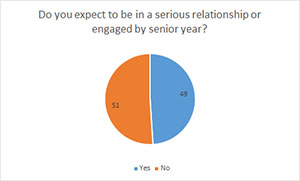
At many colleges, especially Christian colleges, the pressure to meet a significant other in four years is very common. This year, getting a “ring by spring” will be even easier at Pepperdine with the new online dating site, ringbyspring.com.
Following in the footsteps of Pepperdine alum Neil Clark Warren, who started EHarmony, Pepperdine juniors Christian Montoya and Matthew Fuller, and their friend Matthew McMartin, a freshman at Cal Baptist University, cofounded the dating website. This will be the eighth site they’ve started in three years. Their goal is to match couples within their own schools.
“College students want three things: food, money and affection,” said Montoya, a junior business management major. “Since we can’t provide food or money, we decided to give affection.”
In a spring 2014 survey of 126 underclassmen, 56 percent said they believed part of the college experience is finding your soulmate and 49 percent expect to be in a serious relationship or engaged by the time they graduate from Pepperdine.
The three business management majors met working at Trader Joe’s, a grocery store in their hometown, in the summers before college. McMartin said he is the same age as his colleagues, but took a couple years off to get this project up and running. Fuller was the one who first had the idea for RingBySpring.com.
“We believe in dating with a purpose,” they wrote in the mission statement posted on the site. “That is why we created a safe alternative for singles to find friendship and a real relationship with someone at their own school.”
They first launched personalized sites at CBU and Point Loma and then Azusa Pacific, Biola, Loyola, University of California Berkeley and University of California Riverside.
“The other sites have been successful,” McMartin said. “We are moving forward with our primary market being Christian schools.”
“Ring by Spring” has not taken off at secular schools such as Berkeley or Riverside, as it has at religiously affiliated schools.
“It just didn’t work at secular schools,” McMartin said. “We had very few sign-ups.”
Pepperdine Relationship IQ Director Hannah Parmelee said there are a few different reasons people at Christian schools tend to marry young.
“Part of it is the heritage and history of Christian schools,” she said. “There used to be a big culture of women going to college to get the ‘MRS’ degree.”
Another part of it is the value placed on marriage within the Christian culture. Because Pepperdine puts a heavy emphasis on academics, ring by spring is not as much of a pressure as it is at other Christian universities, Parmelee said.
“Pepperdine has a good balance,” she said. “Marriage is valuable but marriage is not everything.” After four years of dating, Parmelee got engaged to her husband in December of her senior year. Parmelee’s parents and her in-laws also met at Pepperdine. “I didn’t feel any pressure to get engaged,” she said.
While Pepperdine students were fine with the engagement, Parmelee said her friends from outside school were surprised. “We felt like we had to explain ourselves to people outside of Pepperdine,” Parmelee said.
The average age for a couple to get married in the U.S. is 27, according to Census Bureau data.
So far, the Ring by Spring site has had 93 Pepperdine students pre-register. It will launch as soon as the site has 200 Pepperdine participants, Montoya said. All members of the website must be Pepperdine students and membership is free. They take your Pepperdine email, you make a profile, you get matched and start talking.
“All together we have had 35,000 visits to the website since we started one month ago,” Montoya said with confidence.
It’s no surprise that the site has gotten so many visits from Pepperdine students.
Jamie Howard, a senior liberal arts major, said within his circle of friends, about half of them are either dating or in serious relationships and the serious ones feel pressure to get engaged.
“At the end of the day, that couple has to decide if they are ready for a ring by spring,” Howard said.
Hannah Novak, a junior interpersonal communications major who is currently in a relationship, said she dislikes the pressure of ring by spring.
“I don’t enjoy the pressure seniors feel to settle down so quickly after college,” she said. “I think it makes people feel like they’ve failed if they graduate without a serious significant other or having dated at all.”
Onur Sahin, a senior philosophy major and member of the Sigma Epsilon fraternity, said he believes ring by spring is more prevalent in sororities and fraternities.
He said he has known seven couples that got engaged and he’s been to two weddings for friends during his time at Pepperdine.
Tanner Heckle, a junior resident adviser in a freshman dorm, said he hates the idea of ring by spring. Unlike many of his classmates, he does not believe it’s a real pressure.
“Yes, the concept exists,” he said. “No, it is not a pressure.”
Sarah Riggs, a junior at Abilene Christian University, said she met her husband at church and they started dating in 2011. They got married a year later (when she was a sophomore). They now have a 3-month-old baby and are living in a home in Abilene.
“Ring by spring is definitely a thing at ACU,” she said. “People always joke about it, but when people actually do get married young, the judgment and opinions start to come out of the woodwork.”
In the Pepperdine survey, students seemed to hold opposite views of engagements in college. Some said they think that meeting a significant other is the purpose of college while others think it is not important at all. One participant commented in the “other comments” section, “deciding what to eat for breakfast is more important to me than finding my soulmate in college.”
Whitney Young completed this story in Dr. Christina Littlefield’s spring 2014 Jour 241 class.




